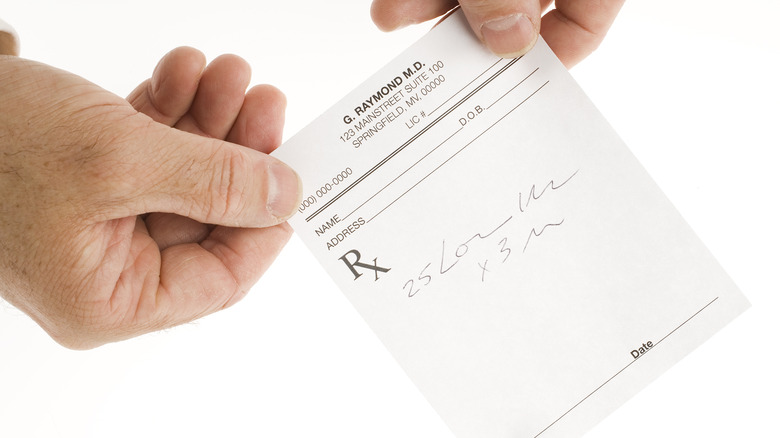Here's Why A Pharmacist Might Not Be Able To Fill Your Prescription
When you visit your pharmacy to fill or refill a prescription, you expect to go in, give your information, and walk out with the prescription you need. However, the process isn't always quite as smooth. Between inventory problems, missing patient information, insurance issues, and several other hiccups that can arise, you might not be able to get your prescription filled.
Did you know there are some circumstances where a pharmacist can even refuse to fill your prescription? Several states have laws in place allowing pharmacists to deny a prescription for specific reasons, including going against their morals. California and Arkansas are two of the few states with these "conscience laws." However, it's more common for a pharmacist to refuse to fill a prescription for an easy-to-fix reason, like needing a little extra time to validate a prescription or double-checking on a potentially dangerous medication interaction. Luckily, these are usually just temporary problems.
If there are any issues with your medication, your pharmacist will likely explain the issue and what they're doing to solve it. Still, being aware of the most common reasons a pharmacist might not be able to fill your prescription could help you feel more prepared if you face a problem in the future.
Your information isn't in the pharmacist's system or it's out of date
Many people have a preferred pharmacy they like to use, usually because the pharmacy is near their home or because the pharmacy has a good rewards system that helps save them money. Regardless of the reason, it's an excellent idea to stick with one pharmacy, if possible. Not only does it make it easier for your doctors to have your preferred pharmacy on your medical record, but it also ensures your safety when filling prescriptions.
Your pharmacy needs basic information about you before it can fill your prescription, including your name, date of birth, and address. Perhaps more importantly, it needs to know what medications you're currently taking so the pharmacist can ensure that any new medicines your doctor prescribed don't interact with those. The pharmacy will also keep your insurance information on file to streamline the process of billing your insurance company for your prescription.
If you give your prescription to a new pharmacy, it can't fill it until it has this information in its system. Similarly, if you visit your regular pharmacy but haven't had your information updated in a while, your pharmacist may ask you to update your file before filling your prescription.
The pharmacy is out of your prescribed medication
Pharmacies must keep medications stocked, just like typical stores have to keep their shelves stocked with products. Unfortunately, predicting how much of each medication they need is not always possible, causing potential inventory problems. Supply chain issues with specific medications can also affect whether your medication can be filled. When your pharmacy runs out, a pharmacist will likely contact you to let you know an estimated date when your medication should be available. But what happens if you can't wait a few days for it to arrive?
Many pharmacies are happy to work with other pharmacies in the area to get you your medication as quickly as possible. Simply ask your pharmacist if they can check their network to find another nearby pharmacy that you can visit for this prescription. Alternatively, your medication may have an alternative that you can use. In this case, the pharmacist can check with your doctor to get their approval for a temporary switch, even if it's only until your original medication arrives.
There are issues with your insurance
Health insurance can help you make healthcare costs more affordable. In addition to using your insurance when you visit your doctor, you may also use it when you work with a pharmacy that accepts your insurance if you have coverage for prescription medications. Of course, in order to use your insurance, the pharmacy has to be able to contact your insurance carrier for approval of your medication.
When that approval doesn't happen, your pharmacist may halt your prescription until they can clear it up. Insurance companies may deny a prescription if your doctor didn't get preauthorization first or you're using an out-of-network pharmacy. Usually, they'll call you to see if you'd like to still move ahead with your prescription and pay out of pocket. If not, you can call your insurance company to see if there's an in-network pharmacy you can use or what your doctor can do to help put your prescription through.
Your prescription is difficult to read or looks altered
People often joke about the handwriting of some doctors being akin to the scribbles of a young child. But when it comes to written prescriptions, it's that hard-to-decipher handwriting that could cause problems when filling medications at the pharmacy.
Pharmacists can turn away prescriptions if they can't read them clearly. Your pharmacist also needs to know exactly what a prescription says so that they can dispense it properly for your safety. Usually, the remedy is just a quick call to the prescriber to verify what the prescription says. The pharmacist may ask the provider to rewrite the prescription or send it electronically to avoid another issue with illegibility.
Pharmacists can also deny your prescription if they think it looks altered in some way. This is for your benefit as the patient, as pharmacists are trained to protect against prescription fraud. If your pharmacist notices anything questionable, like a prescription that looks photocopied or seems to have two different types of handwriting on it, they might take some time to verify the prescription with your provider before filling it.
The prescriber isn't authorized to prescribe your medication
Being in the medical field does not automatically warrant someone as eligible to prescribe medication for a patient. In contrast, the law specifies who can legally write prescriptions. Doctors of Medicine (MDs) and Doctors of Osteopathic Medicine (DOs) can prescribe medications if they have a valid registration number with the Drug Enforcement Administration (DEA). In most cases, physician assistants (PAs) and nurse practitioners (NPs) can also write prescriptions, but they do so under the supervision of an MD or DO. Furthermore, prescribers writing prescriptions for controlled substances must specifically be authorized to prescribe those controlled substances.
Pharmacists check the validity and authorization of a prescriber before filling a prescription. Again, this is for your safety to ensure that you're receiving a prescription from someone who's allowed, by law, to prescribe it. If a pharmacist notices that a DEA registration has lapsed or is not familiar with the prescriber, your prescription may be put on hold until the pharmacist can validate the prescriber.
Your prescription could interfere with your other medications or conditions
As much as you might need a medication, there's a chance that it could interfere with other medicines you already take. When you establish yourself with a doctor, your doctor typically keeps a running list of medications you take in your medical record, including any over-the-counter medications you take. This helps to prevent issues when prescribing a medication that could potentially have a serious interaction with something else you take.
Many pharmacies also do the same, adding another layer of protection to catch these problems. This is why your pharmacy might ask you to update your medication list once a year or more frequently. When a pharmacist runs your new prescription, they might be alerted to a possible interaction between your medications, and will share the details with you before filling your prescription.
Even if your prescription goes through smoothly, it's a good idea to ask the pharmacist about potential interactions when you pick up your prescription to err on the side of caution.
The pharmacist notices an error
Filling a prescription is usually straightforward, but sometimes, a pharmacist might run into an error that halts your prescription. One problem that could happen is that your provider prescribed an unusual amount of medication compared to other prescriptions. This could be simply a written error, which your pharmacist can usually correct quickly by calling the provider and verifying the prescription.
Other issues can arise with medication renewals and refills. A renewal refers to the timeframe in which you can refill a medication before seeing your doctor for a new prescription, usually 12 months. According to the American Medical Association, some states have longer periods, like Iowa's 18 months, for renewals. A refill is when you get more of your medication from the pharmacy. Your pharmacist will deny a refill when you have no more refills left in your renewal period. If you try to refill your prescription too early, you might also get a denial.
In some cases, you can get a prescription refill early. Say, for example, you lost your pill bottle, but you still have two weeks left until you can get a refill. Some pharmacies will refill certain prescriptions, like insulin or birth control, in these emergencies to help you continue your medication.
Your medication goes against the pharmacist's personal beliefs
Although not a common reason for not filling a prescription, pharmacists are allowed to exercise their rights when it comes to objecting to a medication due to moral or religious beliefs. Only a handful of states allow this, though, including Mississippi and South Dakota, and each state has specific rules regarding what a pharmacist can and can't deny. This is similar to laws put in place allowing medical doctors to refuse certain procedures.
An example of this is a pharmacist refusing to refill your birth control prescription, citing moral or religious issues that go against their religion or culture. NBC News reports that pharmacies have also refused to fill prescriptions for hormones and pregnancy-terminating medications for similar reasons.
Fortunately, if you run into this problem, you can take your prescription elsewhere to find a pharmacist who will fill it for you. Your doctor may also know of a pharmacy that won't turn you down, so consider calling them if you aren't having luck.
The prescriber didn't follow the rules for an electronic prescription
Prescribing medication electronically has become more commonplace in the medical field over the last several years with the move to electronic medical records. The process holds several benefits for prescribers, including preventing written errors, tracking prescription refills, and saving time writing and managing prescriptions. Customers can also benefit from not worrying about lost prescription slips and potentially getting their prescriptions quicker.
However, prescribers must meet specific rules for electronic prescriptions, especially regarding controlled substances. These requirements vary by state and are put in place to help control prescription fraud and the misuse of opioids. Many states now require controlled substances to be prescribed electronically, causing written prescriptions to be turned down. Also, any electronic prescriptions for controlled substances can't be altered during transmission and must be sent using a secure, approved application that allows the prescriber to sign the prescription digitally. If an electronic prescription doesn't meet the required parameters, the pharmacist can place your prescription on hold until the situation resolves.
What you can do if a pharmacist won't fill your prescription
Many problems with prescriptions that we've talked about are just temporary, and may even be fixed within a few minutes after a quick call to your doctor. However, if you're having continued issues with a prescription or don't feel as though your pharmacy is prioritizing getting your medication to you as quickly as possible, you can try a few things yourself to speed up the process.
First, try contacting your insurance company or prescribing physician yourself, depending on the nature of the problem. Either one can give you some guidance regarding your medication and any alternatives you might be able to use instead. If that doesn't work to find a solution, you might consider switching to a different pharmacy. Call a few in your area first to see if they have your medication in stock and if they foresee any issues with filling your prescription. Finally, if you believe your pharmacist unfairly denies your medication, you can file a complaint with your state board of pharmacy.











